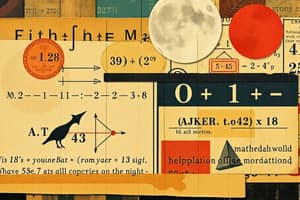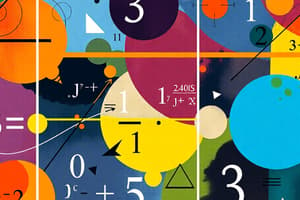Podcast
Questions and Answers
Which of the following sets includes all integers?
Which of the following sets includes all integers?
- Natural numbers
- Integers (correct)
- Rational numbers
- Whole numbers
What distinguishes irrational numbers from rational numbers?
What distinguishes irrational numbers from rational numbers?
- Irrational numbers are always negative.
- Irrational numbers cannot be expressed as a ratio of two integers. (correct)
- All irrational numbers are whole numbers.
- Irrational numbers can be expressed as fractions.
What is the main purpose of deductive reasoning in mathematics?
What is the main purpose of deductive reasoning in mathematics?
- To make predictions based on observations.
- To identify patterns in data.
- To collect data for analysis.
- To apply general principles to reach specific conclusions. (correct)
Which of the following best defines a union of two sets?
Which of the following best defines a union of two sets?
Which of the following is NOT a step in effective problem-solving strategies?
Which of the following is NOT a step in effective problem-solving strategies?
Which of the following is considered a key branch of mathematics?
Which of the following is considered a key branch of mathematics?
What fundamental concept does arithmetic primarily deal with?
What fundamental concept does arithmetic primarily deal with?
Which of the following is NOT a property that helps simplify calculations in arithmetic?
Which of the following is NOT a property that helps simplify calculations in arithmetic?
In algebra, what does a variable typically represent?
In algebra, what does a variable typically represent?
Which of the following concepts is a focus of differential calculus?
Which of the following concepts is a focus of differential calculus?
Which geometric concept involves the study of angles and shapes?
Which geometric concept involves the study of angles and shapes?
Which measure is used to summarize the central tendency of a data set?
Which measure is used to summarize the central tendency of a data set?
Which type of geometry is based on axioms and explores spatial relationships?
Which type of geometry is based on axioms and explores spatial relationships?
Flashcards
Rational Numbers
Rational Numbers
Numbers that can be written as a fraction of two integers, like 1/2 or 3/4.
Irrational Numbers
Irrational Numbers
Numbers that cannot be expressed as a fraction of two integers, like the square root of 2 or pi.
Set
Set
A collection of objects.
Deductive Reasoning
Deductive Reasoning
Signup and view all the flashcards
Inductive Reasoning
Inductive Reasoning
Signup and view all the flashcards
What is mathematics?
What is mathematics?
Signup and view all the flashcards
What is arithmetic?
What is arithmetic?
Signup and view all the flashcards
What is algebra?
What is algebra?
Signup and view all the flashcards
What is geometry?
What is geometry?
Signup and view all the flashcards
What is calculus?
What is calculus?
Signup and view all the flashcards
What is statistics?
What is statistics?
Signup and view all the flashcards
What are properties of numbers in arithmetic?
What are properties of numbers in arithmetic?
Signup and view all the flashcards
What is Euclidean geometry?
What is Euclidean geometry?
Signup and view all the flashcards
Study Notes
Fundamental Concepts
- Mathematics is the study of quantity, structure, space, and change.
- It involves exploring abstract concepts and their relationships through logical reasoning.
- Key branches of mathematics include arithmetic, algebra, geometry, calculus, and statistics.
- Mathematics is used to model and solve problems in various fields like physics, engineering, computer science, and economics.
Arithmetic
- Arithmetic deals with the basic operations of numbers: addition, subtraction, multiplication, division, exponentiation, and radicals.
- It forms the foundation for more advanced mathematical concepts.
- Understanding place value is crucial for performing arithmetic operations correctly.
- Properties of numbers, such as commutative and associative properties, simplify calculations.
Algebra
- Algebra uses symbols (variables) to represent unknown quantities and express relationships between them.
- It employs equations and inequalities to solve problems.
- Key concepts include solving linear equations, quadratic equations, systems of equations, and functions.
- Algebraic manipulation involves simplification, factoring, and expanding expressions.
Geometry
- Geometry studies shapes, sizes, and spatial relationships.
- It involves the properties of lines, angles, triangles, quadrilaterals, circles, and three-dimensional objects.
- Euclidean geometry is a fundamental system based on axioms and postulates.
- Non-Euclidean geometries explore alternative structures and spaces.
Calculus
- Calculus deals with continuous change and rates of change.
- It consists of differential and integral calculus.
- Differential calculus calculates instantaneous rates of change (derivatives).
- Integral calculus determines accumulated quantities (integrals).
- Applications include finding areas, volumes, and solving optimization problems.
Statistics
- Statistics involves collecting, organizing, analyzing, and interpreting data.
- It uses descriptive statistics to summarize data and inferential statistics to draw conclusions.
- Common concepts include measures of central tendency (mean, median, mode), measures of dispersion (variance, standard deviation), and probability distributions.
- Statistical methods are used in various fields, including social sciences and business.
Number Systems
- Natural numbers (counting numbers): 1, 2, 3, …
- Whole numbers: 0, 1, 2, 3, …
- Integers: ..., -3, -2, -1, 0, 1, 2, 3, …
- Rational numbers: numbers that can be expressed as a ratio of two integers (e.g., 1/2, 3/4, -2/5).
- Irrational numbers: numbers that cannot be expressed as a ratio of two integers (e.g., √2, π).
- Real numbers: the set of all rational and irrational numbers.
- Complex numbers: numbers that include real and imaginary parts (e.g., a + bi).
Sets and Logic
- Sets are collections of objects.
- Set operations include union, intersection, and complement.
- Logic is the study of valid reasoning and arguments.
- Basic logical connectives include "and," "or," "not," "if-then."
- Mathematical reasoning often employs deductive and inductive logic.
Mathematical Reasoning
- Deductive reasoning uses general principles to reach specific conclusions.
- Inductive reasoning observes patterns to make generalizations.
- Proof techniques demonstrate the validity of mathematical statements, often using deductive reasoning.
Problem-Solving Strategies
- Understanding the problem is crucial.
- Identifying relevant information is essential.
- Developing a plan to solve the problem is necessary.
- Implementing the plan and performing calculations may require different strategies.
- Evaluating the solution to ensure accuracy is imperative.
Studying That Suits You
Use AI to generate personalized quizzes and flashcards to suit your learning preferences.





